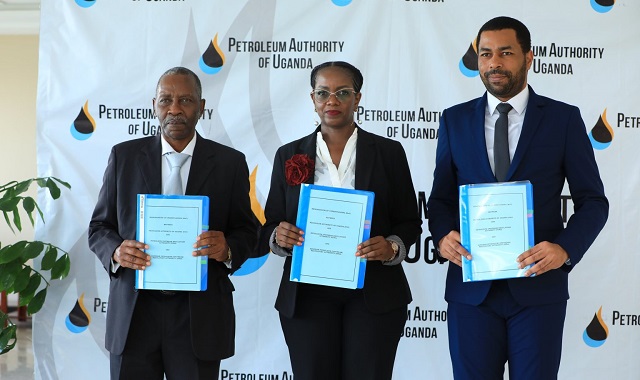
The cooperation agreement comes as Uganda faces questions over the readiness of its domestic oil infrastructure, particularly the proposed refinery in Hoima District
Kampala, Uganda | THE INDEPENDENT | Uganda signed a tripartite agreement with Tanzania and Zanzibar to deepen regulatory cooperation in the oil and gas sector, as the East African nation pushes toward its target of first oil production in 2026 despite lingering uncertainty over the timeline for its long-delayed refinery project.
The deal, signed in Entebbe on June.17, brings together Uganda’s Petroleum Authority (PAU), Tanzania’s Petroleum Upstream Regulatory Authority (PURA), and the Zanzibar Petroleum Regulatory Authority (ZPRA).
It aims to harmonise regional standards and facilitate joint efforts in petroleum resource management, cost control, environmental compliance, local content development, and capacity building.
“The East African region is one of the most prolific frontier areas for oil and gas exploration and development,” PAU Board Chairperson Lynda Biribonwa said at the signing ceremony.
“Collaboration among regulators is essential to leverage existing expertise and maximise investment.”
The Memorandum of Understanding formalises years of informal engagement, particularly between Uganda and Tanzania, whose governments are jointly backing the $5 billion East African Crude Oil Pipeline (EACOP), designed to transport Ugandan oil to international markets via the Tanzanian port of Tanga.
“This MoU will allow us to share best practices and build long-term capability to attract and sustain investment,” said Halfani R. Halfani, Board Chair of PURA. ZPRA Managing Director Muhammed S. Said added that pooling regulatory knowledge would benefit the region’s broader industry ambitions.
Delayed refinery
The cooperation agreement comes as Uganda faces questions over the readiness of its domestic oil infrastructure, particularly the proposed refinery in Hoima District. In March, Uganda signed a deal with UAE-based Alpha MBM Investments LLC to develop the $4 billion facility, which is expected to process 60,000 barrels of crude oil per day.
Under the terms of the agreement, Alpha MBM will hold a 60% stake in the refinery project, while Uganda’s state-owned National Oil Company (UNOC) will retain 40%. However, the government has yet to conclude additional contractual arrangements with the investor, and it remains unclear when construction will commence.
Without a functioning refinery, Uganda could be forced to export all its crude through EACOP once the pipeline becomes operational. While authorities have maintained a 2026 target for first oil, analysts have warned that any further delays in infrastructure rollout could weigh on investor confidence and delay revenue inflows.
PURA Director General Charles J. Sangweni, speaking at the signing, said negotiations for the tripartite agreement had been underway for about a year. He noted that expanding cooperation to other East African nations, including Kenya, is also under consideration.
Delegations from Tanzania and Zanzibar are scheduled to tour Uganda’s oil fields in the Albertine Graben this week to assess progress toward production readiness.
“This MoU strengthens our ties and lays the groundwork for increased technical collaboration,” Sangweni said.
1.4billion barrels
Uganda estimates its recoverable oil reserves at 1.4 billion barrels. The refinery, when complete, is expected to help the country reduce its dependence on imported petroleum products and generate value-added revenue.
Officials at the ceremony underscored the importance of regional cooperation, citing the Swahili maxim “Umoja ni nguvu” — unity is strength — as a guiding principle.
“Together, let us chart a transformative path for the petroleum industry in East Africa,” Biribonwa said.
 The Independent Uganda: You get the Truth we Pay the Price
The Independent Uganda: You get the Truth we Pay the Price



